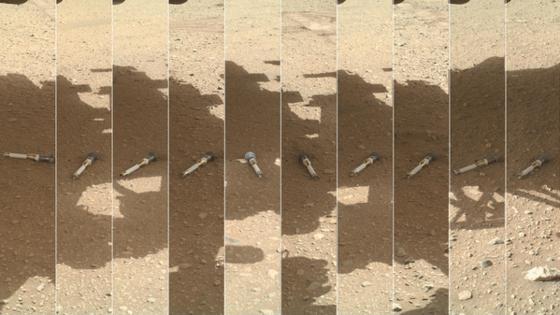Too expensive, too slow: NASA asks for help with JPL's Mars Sample Return mission
Published in Science & Technology News
After months of turmoil over the future of a vaunted mission to bring samples of the Red Planet back to Earth, NASA has its verdict on Mars Sample Return.
The space agency is "committed" to bringing those rocks back from Mars, administrator Bill Nelson said Monday, but will have to do it with way less money and in far less time than currently designed.
And how exactly is NASA going to pull that off? Right now it has no idea — and it's looking for someone who does.
"I have asked our folks to reach out with a request for information to industry, to (the Jet Propulsion Laboratory) and to all NASA centers, and to report back this fall an alternate plan that will get (the samples) back quicker and cheaper," Nelson said in a press conference at NASA headquarters.
His comments came in response to an independent review commissioned by NASA last year that declared there was "near zero probability" of Mars Sample Return making its proposed 2028 launch date, and "no credible" way to fulfill the mission within its current budget.
Pulling off the mission as designed would likely cost up to $11 billion, the review board found, with the samples not reaching Earth until at least 2040.
"The bottom line is that $11 billion is too expensive, and not returning samples until 2040 is unacceptably too long," Nelson said. "It's the decade of the 2040s that we're going to be landing astronauts on Mars."
The announcement comes as something of a blow to JPL, the La Cañada Flintridge, California, institution tasked with managing the mission. JPL has already laid off more than 600 employees and 40 contractors this year after NASA ordered it to reduce spending in anticipation of budget cuts spurred by the challenges of Mars Sample Return.
Proposals go out soon to all NASA centers and the private aerospace sector for "a revised plan that utilizes innovation and proven technology to lower risks, to lower costs and to lower mission complexity so we can return these really precious samples to Earth in the 2030s," said Nicky Fox, associate administrator, Science Mission Directorate. The due date for proposals is next month, and those selected for further study will get NASA grants this summer.
This essentially puts JPL in a position of having to compete for its own project.
...continued
©2024 Los Angeles Times. Visit latimes.com. Distributed by Tribune Content Agency, LLC.







Comments